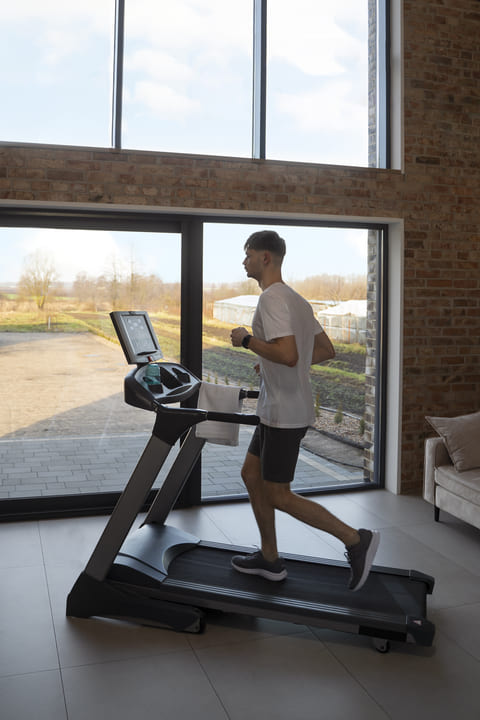In Bangalore, where we face over 100 rainy and 90 chilly days annually, treadmills seem like the perfect solution for consistent walking. But here’s the rub: your knees might not agree.
As an Ayurvedic doctor, I’ve seen scores of patients limp with treadmill-induced injuries. The good news is that it doesn’t have to be this way.
Let’s examine the art of treadmill walking that nurtures, rather than punishes, your knees.
The Treadmill Dilemma
Treadmill use is rising in India, where 15% of adults suffer from knee osteoarthritis. But here’s a startling fact: improper treadmill use can increase knee stress by up to 30%.
So, how do we harness the benefits while sidestepping the pitfalls?
Choosing Your Knee’s Best Friend
Not all treadmills are good. A suitable machine can distinguish between strengthening your knees and visiting the doctor.
Key features to look for
1. Impact Absorption
Seek out treadmills with advanced shock absorption systems. Helpful to your knees.
2. Spacious Belt
A belt at least 20 inches wide and 55 inches long gives you room to move naturally.
3. Stability
A wobbling treadmill is a recipe for disaster. Opt for sturdy construction.
Investing in a quality treadmill means investing in your knee health.
The Art of Treadmill Walking
Now, let’s talk technique. It’s not just about putting one foot in front of the other.
1. Posture is Everything
Stand tall, engage your core, and keep your head up. Imagine a string pulling you upwards from the crown of your head.
2. Step Smart
Take shorter, quicker steps. Overstriding is a common culprit in knee injuries.
3. Arm Swing
Let your arms swing naturally. It’s not just for balance – it helps distribute the workload.
4. Speed and Incline
Start slow and gradually increase. Sudden changes are your knee’s worst enemy.
When the Road Calls
While treadmills offer convenience, something should be said for walking outdoors. Studies show that outdoor walkers exercise for about 30 minutes longer per week than treadmill users.
However, treadmill walking allows for more consistent pacing and controlled environments, which can be crucial for those with knee issues.
So, who lives longer – the road walker or the treadmill enthusiast? The jury’s still out, but the real winner is the one who walks consistently, regardless of the surface.
The Dark Side of Treadmill Walking
Let’s talk about what can go wrong. Knowledge is power, after all.
Common treadmill-induced knee injuries include
1. Patellofemoral Pain Syndrome
That annoying ache under your kneecap.
2. Meniscus Tears
When twisting meets impact.
3. IT Band Syndrome
The outside knee pain can radiate down your leg.
But please don’t let this scare you off. With proper form and a suitable machine, these injuries are far from inevitable.
The Ayurvedic Perspective
In Ayurveda, we believe in balance. Excessive treadmill use can aggravate Vata dosha, leading to joint dryness and instability.
To counteract this,
1. Oil massage your legs before and after walking.
2. Stay hydrated with warm water infused with ginger and turmeric.
3. To maintain flexibility, Practice joint-nurturing yoga poses like Virabhadrasana II (Warrior II).
The Road Ahead
Consistency is vital whether you choose the treadmill or the great outdoors. Only 54% of adults in India meet the WHO’s physical activity recommendations, so regular walking is a step in the right direction.
The goal is to walk well for life and treat your knees respectfully; they’ll keep you moving for years.
So, lace up those shoes, step onto that treadmill (or that garden path), and walk your way to better health. And remember, listen to your body – it’s the best expert you’ll ever meet.

